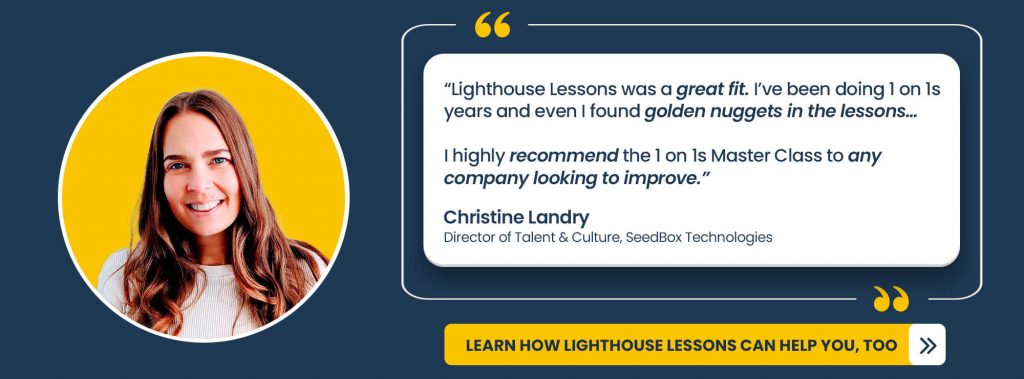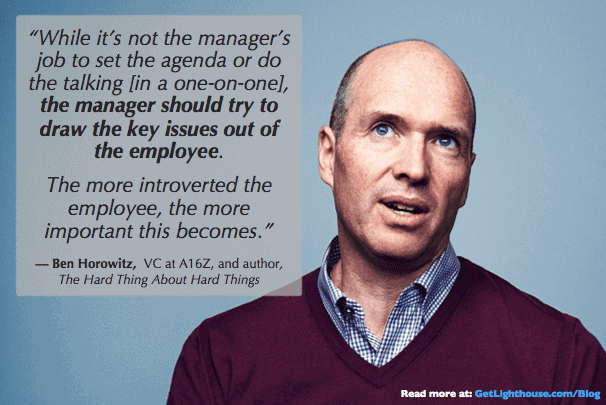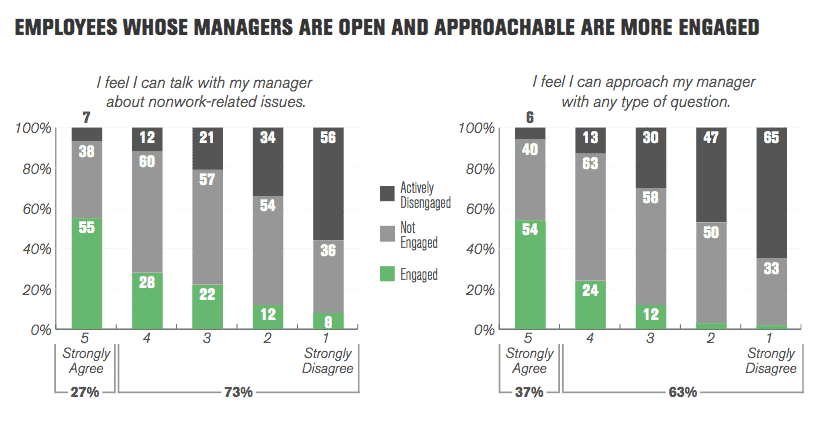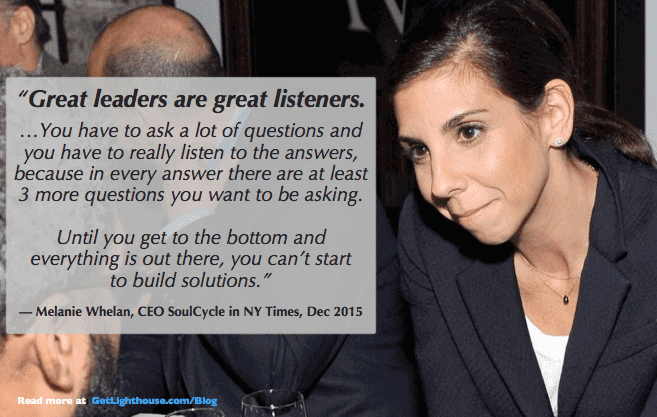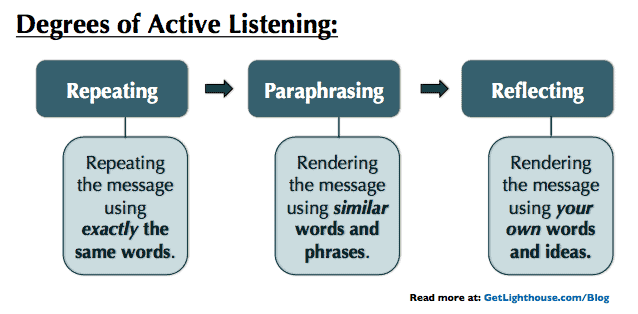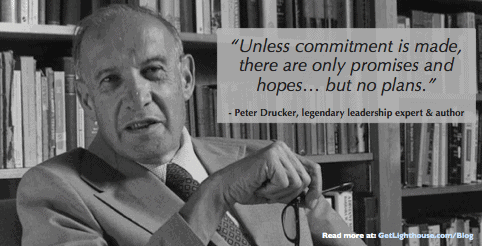"Nope."
"I don't know."
*shrugs*
1:1s can be hard. It takes two people to have a great conversation. Even if you know what makes a great 1:1, you're not guaranteed your team members will do their part and contribute.
So what do you do when you have 1:1s with your team and someone isn't engaging you?
Today we tackle some simple tips that can make all the difference and turn your 1:1s into something you both look forward to.
How to get your team to open up in your 1:1s with them
When you're struggling with a conversation, both sides know it. You can feel the awkward tension in the air and the distance between both of you.
Unlike in a social event, you can't just eject from the conversation and move on. If the person you're struggling to engage with is on your team, you need to take this head on. Otherwise, you'll never have the great working relationship you could, and problems you'd otherwise be able to help with will never surface.
Here's 5 approaches that can help break away from the awkwardness, and open up your 1:1s.
1) Build more rapport and trust with them
When you sit down with a friend, your comfort in talking about most subjects is high. If a stranger asks you about the same things, you're likely to be much more guarded, or even avoid some topics altogether.
While you don't need to be friends with the people you work with, you do need to build rapport with them. If your team doesn't feel like you care about them, or understand what motivates them, they're unlikely to open up to you in your 1:1s and other discussions.
The importance of building a relationship with each of your team members is particularly stark when you look at Gallup's data on the relationship between rapport, trust, and engagement:
If your people don't feel like they can come to you with questions and issues, they're probably not engaged. And if they are resistant to discussions in your 1:1s, it's a warning sign of potential deeper issues of disengagement.
If you're having trouble getting your team to engage and open up in your 1:1s, ask yourself how much rapport you have with them. Before you dig into any other issues, start by showing your interest in them.
Not sure where to start? These 81 approaches give you ideas for building rapport no matter how different you think you are from them.
2) Recognize your introverts
Whether someone is an introvert or extrovert can have a big difference on how to work best with them. As Harvard Business School Professor Francesca Gino describes the difference:
"Extroverts gravitate toward groups and constant action, and they tend to think out loud. They are energized and recharged by external stimuli, such as personal interactions, social gatherings, and shared ideas...
In contrast, introverts typically dislike noise, interruptions, and big group settings. They instead tend to prefer quiet solitude, time to think before speaking (or acting), and building relationships and trust one-on-one. Introverts recharge with reflection, deep dives into their inner landscape to research ideas, and focus deeply on work."
Think about who your introverts are on your team. What works for your 1:1s with your extroverts won't work with your introverts.
As Ben Horowitz notes in The Hard Thing About Hard Things, you need to put additional thought and effort into your 1:1s with your introverts. Here's a few approaches that can help:
- Let them know in advance: While your team member should drive the agenda, letting your introverts know some things you want to discuss in advance can give them the time they need to prepare good thoughts. (More on great 1:1 agendas here)
- Choose the right time: If you have an open office, this can be draining for your introverts. Schedule your 1:1s with them earlier in the day, before they're drained.
- Give it time: Be okay with some silence. Give them time to think when you ask them a question. And be like Ben Horowitz, and ask one more question as you're working to explore a topic with them in your 1:1.
3) Ask better questions
One of the easiest ways to waste your 1:1s is to talk about the wrong things. A status update has no place in your 1:1s.
If you find your team members aren't engaging well in your 1:1s, or they don't feel useful, take a hard look at what you talk about in them.
Asking good questions is one of the best ways to engage your team in their 1:1s. It shows you value their thoughts and opinions.
When you ask followup questions, it shows you are really listening. It also demonstrates your active listening skills:
By bringing great questions to your 1:1s, you improve the quality of the meetings. You also give your team members a reason to think the meetings are worth bringing their effort and engagement to. Introverted leaders often excel at asking thoughtful follow-up questions and demonstrating strong active listening skills during 1:1s.
Here's a few ways to use good questions to get your team to open up:
- Bring some questions to spark discussion: These 101 questions are perfect for your individual contributors, and these 96 are great for the managers that report to you.
- Ask good followup questions: Whether you get a great answer to your first question, or a one-word response, your followup can make all the difference. Ask why, ask for an example, or ask what what they would change.
- Ask for their input: Is an important change coming? Thinking about a new approach to something the team does? Run it by them to get their ideas and buy-in.
4) Change your location
One of the reasons 1:1s are so valuable is that it gives you and your team members a private place to talk about a variety of subjects you normally don't get to cover. However, these discussions are only as good as the privacy you have for them.
Your people won't open up if they feel like they're not actually private. Think about the environment your 1:1s are in, and consider if they'd be better suited somewhere else.
No privacy, no openness.
In a past job we had an open office plan. We had a conference room at the end of the office, which had thin walls, and a door that didn't quite shut. Unless you whispered inside, the sound carried well into the main office.
For some time, we had our 1:1s in there. They didn't go well. It was hard to be candid, especially when I wanted to talk about a situation involving coworkers.
It wasn't until we started taking walks and going to coffee shops nearby that I felt comfortable in my 1:1s. The location change made me feel infinitely more comfortable.
If you're lucky enough to have any nature near your office, consider taking some of your 1:1s as walks in nature. Studies show that even spending a little time in nature can reduce stress, boost creativity, and improve overall mental health.
If you find your team uncomfortable answering certain topics in your 1:1s, consider if the location of your meetings is part of the problem. Move to a different part of your office further from your work area, or consider going outside sometimes.
5) Make progress and keep your promises
Having a good conversation in your 1:1s is important. Taking action afterwards matters even more.
When a team member finally opens up to you about an issue, it's critical you do something about it. Maybe you can't fix it entirely, but your team member needs to feel that you're listening. Nothing proves that better than the actions you take.
As a manager, you should take notes in your 1:1s. Try saying next time, "that sounds important to you. Let me write that down." You may be surprised how much they appreciate it.
Building on your notes, it's important to then talk about actionable steps to end the meeting. Ask, "What can we both do to make progress on this before next time?" This engages them in the process and makes sure your conversation about topics that matter most to them is more than just talk.
Actions speak louder than words.
What you do signals everything to your team. As Marcus Buckingham wrote in "First, Break All the Rules”:
"A manager has got to remember that he is on stage every day. His people are watching him. Everything he does, everything he says, and the way he says it, sends off clues to his employees. These clues affect performance. So never forget you are on that stage.”
A big part of being on stage is demonstrating you care about your team and what they have to say. If you talk about something in a 1:1, make sure you keep your promises.
If you fail to follow up or follow through on what came up in their 1:1, do not be surprised if they stop bringing up issues. Why bother continuing to talk about things if you have no reason to believe it will lead to any change or improvement?
Lead by the example you set. If you keep your promises from 1:1s, there's a strong chance they will, too. This builds a virtuous cycle where your meetings will get better and better, and trust will constantly deepen.
--
Being a manager is never easy. Mastering the 1:1 takes practice and effort.
Your actions before, during, and after these meetings make all the difference in whether your team shuts down, or brings an open approach to them. If you're having trouble getting someone on your team to open up, try some of these approaches to improve them.
Are you and your managers wasting their 1 on 1s?
There is no greater investment to make in your team than having 1 on 1s. Yet, done poorly they’re a huge waste of time.
That’s why we made the 1 on 1 Master Class. You and your fellow managers learn step by step how to supercharge these meetings to motivate your teams, fix problems, coach your people, and much more.
You can learn how Lighthouse Lessons can help your leaders like we helped SeedBox Technologies by signing up here.
